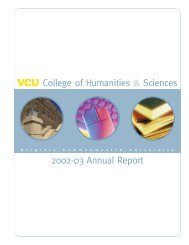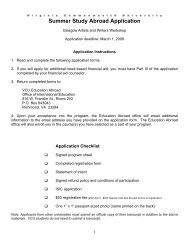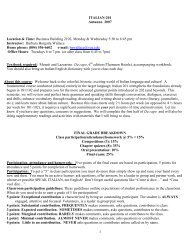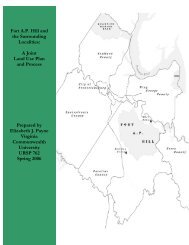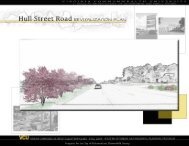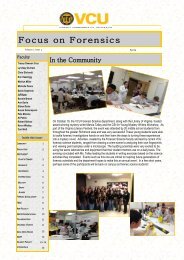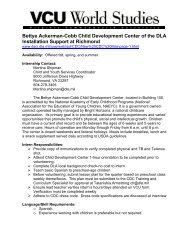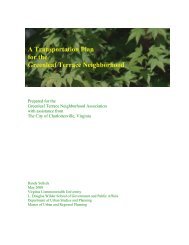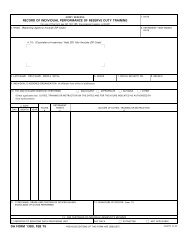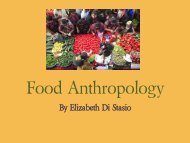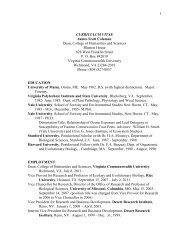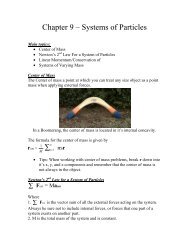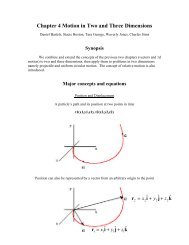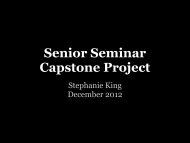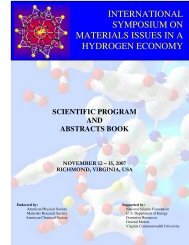2012 Fall - College of Humanities and Sciences
2012 Fall - College of Humanities and Sciences
2012 Fall - College of Humanities and Sciences
You also want an ePaper? Increase the reach of your titles
YUMPU automatically turns print PDFs into web optimized ePapers that Google loves.
VCU DEPARTMENT<br />
OF ENGLISH<br />
UNDERGRADUATE<br />
COURSE<br />
DESCRIPTIONS<br />
<strong>Fall</strong> <strong>2012</strong>
Credit Distribution<br />
*Prerequisite for 300‐level writing courses: UNIV 111, UNIV 112, UNIV 200, 200‐level<br />
literature (or equivalent).<br />
*Prerequisite for all 300‐ <strong>and</strong> 400‐level literature courses: Three credits in a 200‐level<br />
literature course (or equivalent).<br />
Writing………………………….. 304, 305, 307, 435*, 437*, 439*, 491<br />
Criticism………………………...311, 352, 485<br />
Linguistics………………………390, 391‐006, 448, 452<br />
Literature prior to 1700……...322, 326, 361, 401, 402, 403<br />
Literature 1700‐1945………….332, 335, 336, 337, 340, 372, 373, 374, 480<br />
Literature <strong>of</strong> Diversity………353, 354, 381, 366, 391‐002<br />
**Note: Courses not listed above will count as English elective<br />
credit.
<strong>Fall</strong> <strong>2012</strong> CLASSES<br />
UNIV 111, UNIV 112 or the equivalent is a prerequisite for all 200‐level literature<br />
courses; a maximum <strong>of</strong> three credits <strong>of</strong> 200‐level literature may count toward the 36<br />
credits for the major.<br />
ENGL 206‐901<br />
American Literature<br />
Semester course; 3 lecture hours. 3 credits. Prerequisite: UNIV 112. An<br />
introduction to the literature <strong>of</strong> the United States from the 1860’s to the present,<br />
emphasizing connections among representative works.<br />
Glenn TR 5:30‐6:45pm Call #: 28778<br />
ENGL 206‐902<br />
American Literature<br />
Semester course; 3 lecture hours. 3 credits. Prerequisite: UNIV 112. An<br />
introduction to the literature <strong>of</strong> the United States from the 1860’s to the present,<br />
emphasizing connections among representative works.<br />
Glenn MW 5:30‐6:45pm Call #: 28781<br />
ENGL 215‐001<br />
Textual Analysis<br />
Monsters <strong>and</strong> the Monstrous: This ENGL 215 section will explore monsters as<br />
cultural symbols. We’ll begin with some medieval texts that question the line<br />
between human <strong>and</strong> monster; next, we’ll read various nineteenth‐century<br />
monster narratives <strong>and</strong> examine the cultural anxieties they address; finally, we’ll<br />
look at monsters in contemporary novels, film, <strong>and</strong> TV. The main goals <strong>of</strong> this<br />
course are to examine the various cultural roles that monsters have filled <strong>and</strong> to<br />
exercise <strong>and</strong> develop your critical faculties in reading <strong>and</strong> thinking about a<br />
variety <strong>of</strong> different media.<br />
Brinegar TR 3:30‐4:45pm Call #: 17190<br />
ENGL 215‐002<br />
Textual Analysis<br />
Prerequisite: UNIV 112.<br />
An inquiry into literary texts, emphasizing critical thinking <strong>and</strong> close reading.<br />
Individual sections will focus on a unifying question or problem. Students will<br />
study selected texts <strong>and</strong> their times with an emphasis on developing skills in one<br />
or more <strong>of</strong> the following areas: reading, writing, research <strong>and</strong>/or oral<br />
communication. For further course details, please contact instructor.<br />
White TR 9:30‐10:45am Call #: 26958<br />
ENGL 215‐003<br />
Textual Analysis
In this section, we will examine the ideas <strong>of</strong> time <strong>and</strong> identity, <strong>and</strong> especially<br />
ways in which identities, individual <strong>and</strong> group, develop in the context <strong>of</strong> either<br />
specific times (whether historical, mythological, or personal) or specific spaces.<br />
Numerous characters, from Homer’s Odysseus <strong>and</strong> Shakespeare’s Hamlet, even to<br />
more modern protagonists like Buffy the Vampire Slayer, experience moments <strong>of</strong><br />
sudden change or growth—or, alternately, display their inability to change with<br />
their times. How do their struggles with identity reflect the issues <strong>and</strong><br />
controversies <strong>of</strong> their time, society, culture, or beliefs? How do their concerns<br />
about time clarify their anxieties <strong>of</strong> personal change <strong>and</strong> social responsibility, or<br />
reflect the frailties <strong>and</strong> pressures within their changing societies? Course texts<br />
<strong>and</strong> readings draw principally on the western tradition, <strong>and</strong> include epic <strong>and</strong><br />
lyric poetry, drama, narrative fiction, <strong>and</strong> film. The course will be structured<br />
around clusters <strong>of</strong> texts from 4 different times <strong>and</strong> spaces, broadly defined.<br />
Particular emphasis will be placed on reading early literatures in historical <strong>and</strong><br />
cultural context, <strong>and</strong> analyzing their issues in writing.<br />
Shimomura MWF 2:00‐2:50pm Call #: 25403<br />
ENGL 215‐004<br />
Textual Analysis: “The Old Brag <strong>of</strong> My Heart”: Coming <strong>of</strong> Age in America in<br />
the Latter Half <strong>of</strong> the Twentieth Century<br />
In this course we will examine what it means to come <strong>of</strong> age in America during<br />
the latter half <strong>of</strong> the twentieth century. We will begin with a discussion the<br />
Bildungsroman, a sub‐genre <strong>of</strong> the novel that dates back to Germany in the second<br />
half <strong>of</strong> the eighteenth century, <strong>and</strong> then examine more recent examples (<strong>and</strong><br />
perhaps non‐examples) <strong>of</strong> this type <strong>of</strong> narrative in order to underst<strong>and</strong> the form<br />
as it appears in a more recent American context. We will begin with Jeffrey<br />
Eugenides’s The Virgin Suicides (originally published in1993); <strong>and</strong> then, for the<br />
most part, we will work backward towards Carson McCuller’s The Member <strong>of</strong> the<br />
Wedding (originally published in 1946). We will end the course with a discussion<br />
<strong>of</strong> Jerry Gabriel’s Drowned Boy (published in 2010), a short story cycle that shares<br />
many <strong>of</strong> the qualities associated with the novel‐<strong>of</strong>‐growth. In the course <strong>of</strong> our<br />
discussion we will examine the similarities <strong>and</strong> differences in the works in<br />
relation to gender, race, <strong>and</strong> class.<br />
Comba TR 12:30‐1:45pm Call #: 21575<br />
ENGL 215‐005<br />
Textual Analysis<br />
Prerequisite: UNIV 112.<br />
An inquiry into literary texts, emphasizing critical thinking <strong>and</strong> close reading.<br />
Individual sections will focus on a unifying question or problem. Students will<br />
study selected texts <strong>and</strong> their times with an emphasis on developing skills in one
or more <strong>of</strong> the following areas: reading, writing, research <strong>and</strong>/or oral<br />
communication. For further course details, please contact instructor.<br />
TBA MWF 12:00‐12:50pm Call #: 28168<br />
ENGL 215‐006<br />
Textual Analysis<br />
Please contact instructor for course details.<br />
Cohen‐Gee TR 12:30‐1:45pm Call#: 25407<br />
ENGL 215‐007<br />
Textual Analysis<br />
Prerequisite: UNIV 112.<br />
An inquiry into literary texts, emphasizing critical thinking <strong>and</strong> close reading.<br />
Individual sections will focus on a unifying question or problem. Students will<br />
study selected texts <strong>and</strong> their times with an emphasis on developing skills in one<br />
or more <strong>of</strong> the following areas: reading, writing, research <strong>and</strong>/or oral<br />
communication. For further course details, please contact instructor.<br />
TBA MWF 3:00‐3:50pm Call #: 21668<br />
ENGL 215‐009<br />
Textual Analysis<br />
This course will ask you to read a variety <strong>of</strong> literary texts—primarily short fiction<br />
<strong>and</strong> poetry—<strong>and</strong> view a variety art objects at the VMFA (e.g. painting, prints,<br />
photography, sculpture, et al) to explore the relationship between different<br />
creative media in representations <strong>of</strong> gender, family relationships, domestic space,<br />
<strong>and</strong> national identity. The course will provide you with information related to<br />
the items in the VMFA (in the form <strong>of</strong> podcasts, YouTube videos, <strong>and</strong>/or written<br />
information) that helps connect those with the literary texts. In turn, you will be<br />
asked to document <strong>and</strong> reflect upon your experiences in the museum by<br />
maintaining a blog <strong>and</strong>, by the end <strong>of</strong> the semester, create your own alternative<br />
gallery guides that can take the form <strong>of</strong> a podcast, a video, storyboard, prezi or<br />
powerpoint. This course is designed for you to gain ownership over the literary<br />
texts <strong>and</strong> the art objects you encounter in the class <strong>and</strong> in the museum by asking<br />
you to create content reflecting on your experiences in the museum, connecting<br />
that material with the written texts from this class, <strong>and</strong> discussing specific art<br />
items themselves. This process <strong>of</strong> meaningful engagement, thoughtful reflection,<br />
<strong>and</strong> the subsequent creation <strong>of</strong> written, visual, or verbal documents is an integral<br />
part <strong>of</strong> the learning process in this class. The textbook used will be the Norton<br />
Introduction to Literature, Shorter Tenth Edition. Requirements for this course<br />
include two exams, quizzes, a final project (described above), blogging, <strong>and</strong><br />
regular visits to the VMFA. Additionally, students are required to become<br />
student members <strong>of</strong> the VMFA ($10). For questions or a syllabus, please contact<br />
cingrass@vcu.edu.
Ingrassia TR 9:30‐10:45am Call #: 25402<br />
ENGL 215‐010<br />
Textual Analysis<br />
Money: it seems no one can live without it, <strong>and</strong> everyone would like more <strong>of</strong> it.<br />
This section <strong>of</strong> Textual Analysis explores centuries <strong>of</strong> writing (most <strong>of</strong> it<br />
originally in English) depicting people managing—<strong>and</strong>, just as <strong>of</strong>ten,<br />
mismanaging—their money. From the Old Testament to Aesop to Shakespeare to<br />
Austen to Mamet, our reading will survey a breadth <strong>of</strong> literary forms, in addition<br />
to teaching us a thing or two about managing our own finances. The semester<br />
culminates, perhaps predictably, in Dickensʹs A Christmas Carol <strong>and</strong> Capra et<br />
alʹs Itʹs a Wonderful Life.<br />
Chan MWF 9:00am‐9:50am Call #: 25967<br />
ENGL 215‐011<br />
Textual Analysis<br />
Prerequisite: UNIV 112.<br />
An inquiry into literary texts, emphasizing critical thinking <strong>and</strong> close reading.<br />
Individual sections will focus on a unifying question or problem. Students will<br />
study selected texts <strong>and</strong> their times with an emphasis on developing skills in one<br />
or more <strong>of</strong> the following areas: reading, writing, research <strong>and</strong>/or oral<br />
communication. For further course details, please contact instructor.<br />
TBA MWF 2:00‐2:50pm Call #: 28127<br />
ENGL 215‐012<br />
Textual Analysis: Unreliable Narration in Fiction <strong>and</strong> Film<br />
Prerequisite: UNIV 112.<br />
This course examines a wide range <strong>of</strong> untrustworthy storytellers, from the naïve,<br />
misguided, <strong>and</strong> forgetful to those who are deranged, duplicitous, lazy, or full <strong>of</strong><br />
wishful thinking. We will define objective ways <strong>of</strong> analyzing unreliability <strong>and</strong><br />
use them to interpret several ambiguous novels, short stories, <strong>and</strong> films. We’ll<br />
recognize several different types <strong>of</strong> unreliability, see how different media affect<br />
the way those types function, distinguish between dazzling surprises <strong>and</strong> cheap<br />
tricks, <strong>and</strong> make informed arguments about narration. Required texts (with the<br />
correct editions specified) will be available at amazon.com Listmania list ENGL<br />
215.<br />
Nash MWF 10:00am‐10:50am Call #: 27188<br />
ENGL 215‐013<br />
Textual Analysis<br />
This section <strong>of</strong> ENGL 215, “20 th ‐Century Postcolonial Literature,” <strong>of</strong>fers a survey<br />
<strong>of</strong> fiction, poetry, <strong>and</strong> drama from around the world, produced in countries that<br />
once were colonies <strong>of</strong> primarily European powers. Our geographical focus will
e broad: the Middle East <strong>and</strong> North Africa; sub‐Saharan Africa; south <strong>and</strong> east<br />
Asia; Latin America. Most <strong>of</strong> what we study will be work in translation. As we<br />
read, discuss, <strong>and</strong> analyze the texts, we will consider several questions: In what<br />
ways is postcolonial literature a reaction to the experience <strong>of</strong> being colonized, to<br />
both specific <strong>and</strong> general social, economic, <strong>and</strong> political conditions? In what<br />
ways has the colonial/postcolonial experience determined its literature’s subject<br />
matter? Its form? How does postcolonial literature address topics <strong>and</strong> themes<br />
relevant to our underst<strong>and</strong>ing <strong>of</strong> the world today <strong>and</strong> our place in it no matter<br />
where we live or what our history?<br />
Lodge MW 5:30‐6:45pm Call #: 27191<br />
ENGL 215‐901<br />
Textual Analysis: “The Old Brag <strong>of</strong> My Heart”: Coming <strong>of</strong> Age in America in<br />
the Latter Half <strong>of</strong> the Twentieth Century<br />
In this course we will examine what it means to come <strong>of</strong> age in America during<br />
the latter half <strong>of</strong> the twentieth century. We will begin with a discussion the<br />
Bildungsroman, a sub‐genre <strong>of</strong> the novel that dates back to Germany in the second<br />
half <strong>of</strong> the eighteenth century, <strong>and</strong> then examine more recent examples (<strong>and</strong><br />
perhaps non‐examples) <strong>of</strong> this type <strong>of</strong> narrative in order to underst<strong>and</strong> the form<br />
as it appears in a more recent American context. We will begin with Jeffrey<br />
Eugenides’s The Virgin Suicides (originally published in1993); <strong>and</strong> then, for the<br />
most part, we will work backward towards Carson McCuller’s The Member <strong>of</strong> the<br />
Wedding (originally published in 1946). We will end the course with a discussion<br />
<strong>of</strong> Jerry Gabriel’s Drowned Boy (published in 2010), a short story cycle that shares<br />
many <strong>of</strong> the qualities associated with the novel‐<strong>of</strong>‐growth. In the course <strong>of</strong> our<br />
discussion we will examine the similarities <strong>and</strong> differences in the works in<br />
relation to gender, race, <strong>and</strong> class.<br />
Comba TR 4:00‐5:15pm Call #: 26494<br />
ENGL 215‐902<br />
Textual Analysis<br />
Prerequisite: UNIV 112.<br />
An inquiry into literary texts, emphasizing critical thinking <strong>and</strong> close reading.<br />
Individual sections will focus on a unifying question or problem. Students will<br />
study selected texts <strong>and</strong> their times with an emphasis on developing skills in one<br />
or more <strong>of</strong> the following areas: reading, writing, research <strong>and</strong>/or oral<br />
communication. For further course details, please contact instructor.<br />
TBA MW 5:30‐6:45pm Call #: 28169<br />
ENGL 295‐001<br />
The Reading & Writing <strong>of</strong> Fiction & Poetry
An introduction to the basic elements <strong>of</strong> writing poetry <strong>and</strong> fiction, using<br />
published examples <strong>of</strong> contemporary fiction <strong>and</strong> verse as guides in the study <strong>of</strong><br />
literary form <strong>and</strong> the production <strong>of</strong> original creative writing. Students will be<br />
<strong>of</strong>fered a practitionerʹs perspective on genre conventions <strong>and</strong> the process <strong>of</strong><br />
revision. Contact instructor for course details.<br />
Kiley TR 12:30‐1:45pm Call #: 25064<br />
ENGL 295‐002<br />
The Reading & Writing <strong>of</strong> Fiction & Poetry<br />
An introduction to the basic elements <strong>of</strong> writing poetry <strong>and</strong> fiction, using<br />
published examples <strong>of</strong> contemporary fiction <strong>and</strong> verse as guides in the study <strong>of</strong><br />
literary form <strong>and</strong> the production <strong>of</strong> original creative writing. Students will be<br />
<strong>of</strong>fered a practitionerʹs perspective on genre conventions <strong>and</strong> the process <strong>of</strong><br />
revision. Contact instructor for course details.<br />
Saunders MWF 10:00‐10:50am Call #: 23795<br />
ENGL 295‐701<br />
Honors: The reading & Writing <strong>of</strong> Fiction & Poetry<br />
An introduction to the basic elements <strong>of</strong> writing poetry <strong>and</strong> fiction, using<br />
published examples <strong>of</strong> contemporary fiction <strong>and</strong> verse as guides in the study <strong>of</strong><br />
literary form <strong>and</strong> the production <strong>of</strong> original creative writing. Students will be<br />
<strong>of</strong>fered a practitionerʹs perspective on genre conventions <strong>and</strong> the process <strong>of</strong><br />
revision. Contact instructor for course details.<br />
TBA TR 3:30‐4:45pm Call #: 28762<br />
ENGL 295‐702<br />
Honors: The Reading & Writing <strong>of</strong> Fiction & Poetry<br />
An introduction to the basic elements <strong>of</strong> writing poetry <strong>and</strong> fiction, using<br />
published examples <strong>of</strong> contemporary fiction <strong>and</strong> verse as guides in the study <strong>of</strong><br />
literary form <strong>and</strong> the production <strong>of</strong> original creative writing. Students will be<br />
<strong>of</strong>fered a practitionerʹs perspective on genre conventions <strong>and</strong> the process <strong>of</strong><br />
revision. Contact instructor for course details.<br />
Batten MWF 9:00‐9:50am Call #: 23798<br />
ENGL 295‐703<br />
Honors: The Reading & Writing <strong>of</strong> Fiction & Poetry<br />
An introduction to the basic elements <strong>of</strong> writing poetry <strong>and</strong> fiction, using<br />
published examples <strong>of</strong> contemporary fiction <strong>and</strong> verse as guides in the study <strong>of</strong><br />
literary form <strong>and</strong> the production <strong>of</strong> original creative writing. Students will be<br />
<strong>of</strong>fered a practitionerʹs perspective on genre conventions <strong>and</strong> the process <strong>of</strong><br />
revision. Contact instructor for course details.<br />
Kabot MWF 11:00‐11:50am Call #: 23799
ENGL 301‐001<br />
Introduction to the English Major<br />
Prerequisites: ENGL 101 <strong>and</strong> three credits in a 200‐level literature course (or<br />
equivalent).<br />
The primary goal <strong>of</strong> English 301 is to teach incoming English majors to be active<br />
<strong>and</strong> insightful readers <strong>and</strong> interpreters <strong>of</strong> a variety <strong>of</strong> literary texts. In this course<br />
we will study the conventions <strong>and</strong> contours <strong>of</strong> literary studies as a discursive<br />
field. Through the practice <strong>of</strong> careful <strong>and</strong> attentive reading, we will learn how to<br />
enter into a conversation with the texts we consider. Through the act <strong>of</strong> writing<br />
about the texts we have read, <strong>and</strong> through a mastery <strong>of</strong> the conventions which<br />
govern literary studies, we will learn how to enter into the ongoing<br />
conversations that constitute English as a formal academic discipline.<br />
Harrison MWF 10:00‐10:50am Call #: 19316<br />
ENGL 301‐002<br />
Introduction to the English Major<br />
Prerequisites: ENGL 101 <strong>and</strong> three credits in a 200‐level literature course (or<br />
equivalent).<br />
The primary goal <strong>of</strong> English 301 is to teach incoming English majors to be active<br />
<strong>and</strong> insightful readers <strong>and</strong> interpreters <strong>of</strong> a variety <strong>of</strong> literary texts. In this course<br />
we will study the conventions <strong>and</strong> contours <strong>of</strong> literary studies as a discursive<br />
field. Through the practice <strong>of</strong> careful <strong>and</strong> attentive reading, we will learn how to<br />
enter into a conversation with the texts we consider. Through the act <strong>of</strong> writing<br />
about the texts we have read, <strong>and</strong> through a mastery <strong>of</strong> the conventions which<br />
govern literary studies, we will learn how to enter into the ongoing<br />
conversations that constitute English as a formal academic discipline.<br />
Harrison MWF 12:00‐12:50pm Call #: 21703<br />
ENGL 301‐003<br />
Introduction to the English Major<br />
This course is designed to introduce English majors to the fundamental elements<br />
<strong>of</strong> imaginative writing. In this course, we will consider the elements <strong>of</strong> structure,<br />
plot, character, setting, point‐<strong>of</strong>‐view, symbol, <strong>and</strong> theme, <strong>and</strong> examine how they<br />
work in the genres <strong>of</strong> the short story, the play, the poem, <strong>and</strong> the novel. Our goal<br />
is to read critically so as to write thoughtful analytical essays in which we<br />
interpret these elements in order to come to conclusions about a given text. We<br />
will then to build on this goal to write essays with the aid <strong>of</strong> scholarly research.<br />
Comba MWF 9:00‐9:50am Call #: 27563<br />
ENGL 301‐004<br />
Introduction to the English Major<br />
This course will introduce you to the work <strong>of</strong> an English major: reading<br />
(literature, carefully <strong>and</strong> critically) <strong>and</strong> writing (literary argument, coherently<br />
<strong>and</strong> persuasively). To help you develop these skills, we’ll read many poems,
long <strong>and</strong> short, old <strong>and</strong> new; short stories <strong>and</strong> one novel; <strong>and</strong> one play to end the<br />
course. The main goals <strong>of</strong> this course are to develop skills in close reading <strong>of</strong><br />
literature, to develop skills in composing literary arguments, to become familiar<br />
with a variety <strong>of</strong> approaches to literary interpretation, <strong>and</strong> to better underst<strong>and</strong><br />
what you have undertaken by majoring in English.<br />
Brinegar TR 12:30‐1:45pm Call #: 12391<br />
ENGL 301‐006<br />
Introduction to the English Major<br />
Why do we read at all? Why do we write <strong>and</strong> tell stories? These questions come<br />
to us at all levels in the study <strong>of</strong> literature. In this class we will read <strong>and</strong>/or listen<br />
to a variety <strong>of</strong> fiction <strong>and</strong> poetry texts that ponder just these questions while<br />
placing them within larger social contexts, <strong>and</strong> related to our underst<strong>and</strong>ing <strong>and</strong><br />
representations <strong>of</strong> ourselves here, now, today. In this class weʹll read, watch <strong>and</strong><br />
listen to a number <strong>of</strong> stories, both true <strong>and</strong> not true, in which the relationship<br />
between stories, reading, <strong>and</strong> storytelling <strong>and</strong> the ʺrest <strong>of</strong> lifeʺ is made explicit.<br />
We will also listen to a variety <strong>of</strong> contemporary versions <strong>of</strong> ʺoral storytellingʺ<br />
from radio programs in which stories are told rather than read; <strong>and</strong> we will not<br />
only read written poetry on the page, but also listen to <strong>and</strong> watch poetry<br />
performed in live in an environment where improvisation is allowed or even<br />
encouraged. We will also look at examples <strong>of</strong> new media (especially computer<br />
<strong>and</strong> video games) that appear to include stories, or parts <strong>of</strong> stories, as part <strong>of</strong><br />
their contents, <strong>and</strong> at examples <strong>of</strong> ʺrealityʺ television. The class is taught<br />
primarily via discussion; students will write three short papers <strong>and</strong> do some inclass<br />
work as part <strong>of</strong> their participation grade, <strong>and</strong> we will also spend some time<br />
workshopping each othersʹ papers in class.<br />
Golumbia MWF 1:00pm‐1:50pm Call #: 26694<br />
ENGL 301‐007<br />
Introduction to the English Major<br />
In this course we will read <strong>and</strong> analyze examples from different literary genres<br />
with a primary focus on refining the skills helpful in the English major. We will<br />
look at the ways in which language is used in literary texts <strong>and</strong> practice writing<br />
responses to those texts. Some <strong>of</strong> the texts will draw attention to their own<br />
“texture,” the others will provoke us to consider with equal if not more interest<br />
the text’s cultural context. Regardless <strong>of</strong> the different approaches <strong>and</strong> methods<br />
we will adopt in order to scrutinize a variety <strong>of</strong> texts, our ultimate goal is to<br />
become perceptive readers <strong>of</strong> literature highly skilled in deciphering the form<br />
<strong>and</strong> content <strong>of</strong> an author’s work. In order to accomplish the above stated general<br />
objectives <strong>of</strong> this course, I have chosen a selection <strong>of</strong> seminal texts that will allow<br />
us recognize how a literary text is written <strong>and</strong> then “rewritten” over the course<br />
<strong>of</strong> history. A “rewritten” text, as we will discover, <strong>of</strong>ten re‐imagines an earlier
text in terms <strong>of</strong> both form <strong>and</strong> content. It also gives the astute reader the<br />
opportunity to trace the impact <strong>of</strong> time <strong>and</strong> place on a number <strong>of</strong> significant<br />
“universal” themes literature deals with.<br />
Aykol TR 11:00am‐12:15pm Call #: 27950<br />
ENGL 301‐903<br />
Introduction to the English Major<br />
English 301 is an introduction to the kind <strong>of</strong> analytical reading <strong>and</strong> writing your<br />
will be expected to do as an English major. For some <strong>of</strong> you who are well into<br />
your major the course will be a review <strong>of</strong> sorts in that you will be sharpening<br />
skills that you have already learned, perhaps even reading works that you have<br />
already read. I hope, however, that you will all encounter in this course many<br />
texts that you will find exciting to read, reread, discuss, <strong>and</strong> write about. We will<br />
consider works from various genres, among them the short story, the novel, the<br />
poem, <strong>and</strong> the play.<br />
Mangum TR 4:00‐5:15pm Call #: 16920<br />
ENGL 304‐002<br />
Advanced Writing<br />
Prerequisites: UNIV 200 or HONR 200 <strong>and</strong> three credits in a 200‐level literature course<br />
(or equivalent).<br />
An advanced study <strong>of</strong> informative <strong>and</strong> persuasive prose techniques, with<br />
attention to the relationships among content, form <strong>and</strong> style. May not be used to<br />
satisfy the literature requirement <strong>of</strong> the <strong>College</strong> <strong>of</strong> <strong>Humanities</strong> <strong>and</strong> <strong>Sciences</strong>.<br />
Contact instructor for course details.<br />
Dacey TR 2:00‐3:15pm Call #: 27381<br />
ENGL 304‐003<br />
Advanced Writing<br />
Prerequisites: UNIV 200 or HONR 200 <strong>and</strong> three credits in a 200‐level literature course<br />
(or equivalent).<br />
An advanced study <strong>of</strong> informative <strong>and</strong> persuasive prose techniques, with<br />
attention to the relationships among content, form <strong>and</strong> style. May not be used to<br />
satisfy the literature requirement <strong>of</strong> the <strong>College</strong> <strong>of</strong> <strong>Humanities</strong> <strong>and</strong> <strong>Sciences</strong>.<br />
Contact instructor for course details.<br />
Macdonald TR 11:00am‐12:15pm Call #: 25050<br />
ENGL 304‐901<br />
Advanced Writing<br />
Prerequisites: UNIV 200 or HONR 200 <strong>and</strong> three credits in a 200‐level literature course<br />
(or equivalent).<br />
An advanced study <strong>of</strong> informative <strong>and</strong> persuasive prose techniques, with<br />
attention to the relationships among content, form <strong>and</strong> style. May not be used to<br />
satisfy the literature requirement <strong>of</strong> the <strong>College</strong> <strong>of</strong> <strong>Humanities</strong> <strong>and</strong> <strong>Sciences</strong>.
Contact instructor for course details.<br />
TBA M 7:00‐9:40pm Call #: 12401<br />
ENGL 304‐902<br />
Advanced Writing<br />
Prerequisites: UNIV 200 <strong>and</strong> three credits in a 200‐level literature course (or equivalent).<br />
Please contact instructor for course details.<br />
Griffin R 7:00‐9:40pm Call #: 20002<br />
ENGL 305‐001<br />
Writing Poetry<br />
Prerequisites: UNIV 200 or HONR 200 <strong>and</strong> three credits in a 200‐level literature course<br />
(or equivalent).<br />
An introduction to the craft <strong>of</strong> writing poetry. Students will explore the elements<br />
<strong>of</strong> poetic technique <strong>and</strong> produce a volume <strong>of</strong> quality work. Contact instructor for<br />
course details.<br />
Marshall TR 3:30‐4:45pm Call #: 28591<br />
ENGL 305‐901<br />
Writing Poetry<br />
Prerequisites: UNIV 200 or HONR 200 <strong>and</strong> three credits in a 200‐level literature course<br />
(or equivalent).<br />
An introduction to the craft <strong>of</strong> writing poetry. Students will explore the elements<br />
<strong>of</strong> poetic technique <strong>and</strong> produce a volume <strong>of</strong> quality work. Contact instructor for<br />
course details.<br />
Bray M 7:00‐9:40pm Call #: 20005<br />
ENGL 305‐903<br />
Writing Poetry<br />
This is a workshop in poetry writing .Students will be expected to write <strong>and</strong><br />
revise between ten <strong>and</strong> twelve poems, <strong>and</strong> to submit these poems for workshop<br />
discussion. I will also from time to time require students to attempt various<br />
creative writing exercises, <strong>and</strong> to complete three short response papers on<br />
collections which appear on our reading list. Students will meet with me at least<br />
twice during the semester for individual conferences, <strong>and</strong> at semester’s end will<br />
submit a portfolio <strong>of</strong> revisions <strong>of</strong> the semester’s poems. Final grades are<br />
determined primarily by the content <strong>of</strong> the portfolio, but contribution to<br />
workshop discussions <strong>and</strong> the quality <strong>of</strong> the short essays are also factors I will<br />
consider. Probable texts include Catherine MacDonald’s Rousing the Machinery<br />
(Arkansas), Nathaniel Perry’s Nine Acres (Copper Canyon), Robert Pinsky’s<br />
Selected Poems (Farrar, Straus, <strong>and</strong> Giroux), <strong>and</strong> the winner <strong>of</strong> the <strong>2012</strong> Larry<br />
Levis Reading Prize, TBA.<br />
Wojahn TR 4:00‐5:15pm Call #: 24555
ENGL 305‐904<br />
Writing Poetry<br />
Students in this course will read, write, revise, <strong>and</strong> respond to poetry. Each<br />
week they will be given a cluster <strong>of</strong> assigned readings to which they must<br />
respond briefly in writing. They will also be required to complete a creative<br />
assignment in which they will attempt to employ some <strong>of</strong> the various elements <strong>of</strong><br />
craft they have recognized in the assigned texts. Students will share their drafts<br />
in class <strong>and</strong> respond both verbally <strong>and</strong> in writing to the drafts <strong>of</strong> their peers. At<br />
the end <strong>of</strong> the term, they will submit a portfolio <strong>of</strong> their work along with<br />
revisions. Each portfolios will also contain a self‐assessment essay which, in<br />
part, accounts for the changes the student has made to the original drafts.<br />
Graber M 4:00‐6:40pm Call #: 24552<br />
ENGL 307‐01<br />
Writing Fiction<br />
In this entry‐level fiction workshop, students will produce three pieces <strong>of</strong> short<br />
fiction, one <strong>of</strong> which they will revise substantially at the end <strong>of</strong> the semester. In<br />
addition, students will read short fiction by a variety <strong>of</strong> authors, participate in<br />
class discussions about these stories, <strong>and</strong> write short critical response papers to<br />
assigned readings. Goals for the course include increasing student familiarity<br />
with the craft <strong>of</strong> writing fiction, the strengthening <strong>of</strong> critical reading <strong>and</strong> writing<br />
skills, <strong>and</strong> the establishing <strong>of</strong> workshop etiquette—i.e., the proper manner in<br />
which to respond to the creative work <strong>of</strong> colleagues. Authors discussed will<br />
include Alice Munro, Michael Cunningham, Lorrie Moore, Raymond Carver,<br />
Peter Taylor, Jhumpa Lahiri, Jamaica Kincaid, <strong>and</strong> Flannery O’Connor, among<br />
others.<br />
Smith TR 11:00am‐12:15pm Call #: 27875<br />
ENGL 307‐002<br />
Writing Fiction<br />
Prerequisites: UNIV 200 or HONR 200 <strong>and</strong> three credits in a 200‐level literature course<br />
(or equivalent).<br />
A fiction workshop primarily for students who have not produced a portfolio <strong>of</strong><br />
finished creative work. Students will present a collection <strong>of</strong> their work at the end<br />
<strong>of</strong> each course. Contact instructor for course details.<br />
Danvers TR 11:00am‐12:15pm Call #: 27886<br />
ENGL 307‐003<br />
Writing Fiction<br />
Prerequisites: UNIV 200 or HONR 200 <strong>and</strong> three credits in a 200‐level literature course<br />
(or equivalent).<br />
A fiction workshop primarily for students who have not produced a portfolio <strong>of</strong><br />
finished creative work. Students will present a collection <strong>of</strong> their work at the end
<strong>of</strong> each course. Contact instructor for course details.<br />
Boyes TR 3:30‐4:45pm Call #: 28059<br />
ENGL 307‐901<br />
Writing Fiction<br />
Prerequisites: UNIV 200 or HONR 200 <strong>and</strong> three credits in a 200‐level literature course<br />
(or equivalent).<br />
A fiction workshop primarily for students who have not produced a portfolio <strong>of</strong><br />
finished creative work. Students will present a collection <strong>of</strong> their work at the end<br />
<strong>of</strong> each course. Contact instructor for course details.<br />
Lodge MW 5:30‐6:45pm Call #: 28786<br />
ENGL 311‐001<br />
Intro to Literary Theory<br />
This course will introduce you to a variety <strong>of</strong> theoretical concepts <strong>and</strong><br />
interpretive methods employed in writing about literature. It is designed to help<br />
you recognize critical <strong>and</strong> theoretical terms <strong>and</strong> to make you aware <strong>of</strong> the ways<br />
in which these terms are employed in making sense <strong>of</strong> literature. The course will<br />
ask you to think abstractly <strong>and</strong> theoretically about the literary text, but it will<br />
also give you valuable practice in mastering different critical methods through<br />
close readings <strong>of</strong> literary texts. As you may imagine, an introductory course<br />
cannot possibly make you conversant in every critical approach to literature, but<br />
it can make you aware <strong>of</strong> some <strong>of</strong> the major critical <strong>and</strong> theoretical movements<br />
that have influenced the study <strong>of</strong> literature—from new criticism, structuralism<br />
<strong>and</strong> narratology, deconstruction <strong>and</strong> poststructuralism, psychoanalysis,<br />
feminism, queer studies, Marxism, new historicism, to cultural studies, critical<br />
race theory, postcolonial studies, <strong>and</strong> reader response—<strong>and</strong> give you a<br />
reasonably‐broad lexicon <strong>of</strong> important theoretical terms. My two important<br />
teaching goals will be: 1) to help you underst<strong>and</strong> how different critical<br />
approaches are in conversation with each other, <strong>and</strong> 2) to look at the ways in<br />
which literary texts themselves have both resisted <strong>and</strong> informed the<br />
development <strong>of</strong> literary theory. The learning outcomes I project this course will<br />
generate will be: (1) to make you comfortable thinking abstractly <strong>and</strong><br />
theoretically about literary texts; (2) to develop new skills <strong>and</strong> interpretive<br />
practices as an English major. Classes will typically be discussion‐based <strong>and</strong><br />
student‐centered, so please know that you will be expected to participate in<br />
every class discussion. Besides energetic participation, evaluation <strong>of</strong> student<br />
work will also consist <strong>of</strong> one class presentation, 5 short papers, occasional<br />
quizzes, midterm, <strong>and</strong> final exam.<br />
Stanciu TR 3:30‐4:45pm Call #: 27945<br />
ENGL 311‐002<br />
Intro to Literary Theory
Introduces students to the variety <strong>of</strong> critical methods that are sometimes<br />
employed‐ <strong>of</strong>ten subconsciously or habitually‐ in writing about literature. The<br />
course requires students to think abstractly <strong>and</strong> theoretically about the nature <strong>of</strong><br />
the literary text, but it also gives students valuable practice in mastering different<br />
critical methods through close engagements with short stories, poems, <strong>and</strong> plays.<br />
Wells MWF 2:00‐2:50pm Call #: 28787<br />
ENGL 322‐001<br />
Medieval Literature: Old English to Middle English<br />
(Previously ENGL 407)<br />
This course examines Old English epics <strong>and</strong> alliterative poetry in their cultural,<br />
social, <strong>and</strong> literary contexts, <strong>and</strong> the rise <strong>of</strong> Middle English literature following<br />
the Norman Conquest <strong>and</strong> culminating in works <strong>of</strong> Chaucer, his contemporaries,<br />
<strong>and</strong> perhaps their readers up through the fifteenth century. Students will learn a<br />
little bit about reading Old English <strong>and</strong> Middle English, though many texts will<br />
have translations available in modern English. While the course requires no prior<br />
background in older literatures, students must arrive with the willingness to<br />
work to underst<strong>and</strong> older forms <strong>of</strong> the English language. We will read various<br />
genres including saints’ lives, chivalric romances, debate <strong>and</strong> dialogue poetry,<br />
<strong>and</strong> fabliau. Required work includes short papers, exams, a few translation<br />
projects, <strong>and</strong> an in‐class presentation.<br />
Shimomura MWF 9:00‐9:50am Call #: 28221<br />
ENGL 326‐901<br />
Shakespeare in Context<br />
This course examines Shakespeare’s works with particular attention to their<br />
historical, social, <strong>and</strong> literary contexts; in addition to reading Shakespeare, you’ll<br />
read overviews <strong>of</strong> 16 th ‐century society <strong>and</strong> literary culture, as well as some<br />
Renaissance historical <strong>and</strong> poetic writing. The main goals <strong>of</strong> this course are to<br />
develop a fuller underst<strong>and</strong>ing <strong>of</strong> Shakespeare’s works by reading them in<br />
various 16 th ‐century contexts, to improve your ability to underst<strong>and</strong><br />
Shakespeare’s English, <strong>and</strong> to exercise <strong>and</strong> develop your critical faculties in<br />
reading <strong>and</strong> writing.<br />
Brinegar MW 4:00‐5:15pm Call #: 28126<br />
ENGL 332‐901<br />
18 th Century British Novel & Narrative<br />
(Previously ENGL 415)<br />
The twentieth‐century English novelist E. P. Hartley has said, “The past is a<br />
foreign country. They do things differently there.” This is a course for<br />
enthusiastically serious (seriously enthusiastic?) readers <strong>of</strong> modern novels who<br />
want to know more about some <strong>of</strong> the principal “ancestors” <strong>of</strong> novels they hold<br />
dear today, <strong>and</strong> this is a course for thinking about how those “ancestors” are
different from modern novels. And so we begin with an over‐simplification: the<br />
eighteenth century is when “the novel” was “born.” Critics disagree about what<br />
it means to talk about the “rise” <strong>of</strong> the “novel” in the period; however, there is no<br />
question that we see in this century a wealth <strong>of</strong> fictional prose narratives that are<br />
marked by some <strong>of</strong> the depth, interiority, <strong>and</strong> concern with “the individual” that<br />
we associate with modern novels. And, yet, these early novels are not simply<br />
early <strong>and</strong> pale imaginings <strong>of</strong> modern novels. Early novels have their own<br />
narrative concerns.<br />
This course comes at the question <strong>of</strong> these “early” novels, <strong>and</strong> their special<br />
approach to the novel genre, by reading a number <strong>of</strong> canonical eighteenthcentury<br />
English novels that are concerned not with development <strong>and</strong> progress<br />
(qualities we associate with modern novels) but that exhibit, rather, a ruling<br />
thematic <strong>and</strong> structural concern with recovery <strong>and</strong> return. We will begin by<br />
reading in translation a French prose fiction that was wildly popular in Engl<strong>and</strong><br />
throughout the century; we will consider its status as a masterplot for the<br />
English novels that will be our focus for the rest <strong>of</strong> the term. Of special interest<br />
will be the intersection <strong>of</strong> gender <strong>and</strong> genre.<br />
This will be a reading‐intensive class. Major requirements: participation in class<br />
discussion; weekly Blackboard postings; weekly quizzes; final exam. Likely<br />
primary texts: François Fénelon, The Adventures <strong>of</strong> Telemachus, the Son <strong>of</strong> Ulysses;<br />
Daniel Defoe, Robinson Crusoe <strong>and</strong> The Farther Adventures <strong>of</strong> Robinson Crusoe;<br />
Henry Fielding, Tom Jones; Samuel Richardson, Clarissa (abridged); Ann<br />
Radcliffe, The Romance <strong>of</strong> the Forest.<br />
Swenson TR 4:00‐5:15pm Call #: 27947<br />
ENGL 335‐001<br />
British Literature <strong>of</strong> the Romantic Era<br />
(Previously ENGL 321)<br />
Prerequisite: Three credits in a 200‐level literature course (or equivalent).<br />
Exploration <strong>of</strong> British literature <strong>of</strong> the period 1783‐1837, when the Romantic<br />
Movement flourished. Readings will consist mainly <strong>of</strong> poetry, with some fiction<br />
<strong>and</strong> nonfiction, <strong>and</strong> will include Blake, Wordsworth, Byron, Keats, Austen, both<br />
Shelleys, De Quincey <strong>and</strong> a number <strong>of</strong> other writers. Class will be discussionbased;<br />
assignments will include at least two analytic papers <strong>and</strong> a memorized<br />
poetry recitation.<br />
Frankel TR 9:30‐10:45am Call #: 28123<br />
ENGL 336‐001<br />
19th‐Century British Novels <strong>and</strong> Narratives<br />
(Previously ENGL 416)<br />
Prerequisites: three credits in a 200‐level literature course (or equivalent).<br />
In this course we will trace the British nineteenth century’s cultural <strong>and</strong> social
changes through some <strong>of</strong> its best novels. We will investigate different notions <strong>of</strong><br />
progress expressed in this literature, including the progress <strong>of</strong> certain narrative<br />
techniques <strong>and</strong> the form <strong>of</strong> the novel itself. We will consider the way those<br />
formal dimensions <strong>of</strong> narratives communicate political <strong>and</strong> cultural ideas. This<br />
will let us also reflect on the social responsibility (if any) <strong>of</strong> novelists. This course<br />
will include novels <strong>and</strong> short stories by Austen, Brontë, Dickens, Eliot, Hardy,<br />
<strong>and</strong> James, among others. Engaged, thoughtful, daily discussion is required, as is<br />
a hefty reading load, a research essay, exams, <strong>and</strong> periodic e‐mail posts to the<br />
class list. Required texts (with the correct editions specified) will be available at<br />
amazon.com Listmania list ENGL 336.<br />
Nash MWF 2:00pm‐2:50pm Call #: 27897<br />
ENGL 337‐001<br />
Victorian Poetry<br />
(Previously ENGL 322)<br />
This course will introduce you to British poetry written during the Victorian<br />
period (1837‐1901), with particular attention to the time <strong>and</strong> culture <strong>of</strong> Victorian<br />
Britain. We will read male <strong>and</strong> female poets in roughly equal proportions,<br />
including Alfred Lord Tennyson, Elizabeth Barrett Browning, Robert Browning,<br />
Emily Bronte, Christina Rossetti, Dante Gabriel Rossetti, William Morris, A. C.<br />
Swinburne, Augusta Webster, ʺMichael Field,ʺ Mary Elizabeth Coleridge,<br />
Thomas Hardy <strong>and</strong> Ernest Dowson. Class assignments will include two or three<br />
essay papers, biweekly written responses, <strong>and</strong> one ʺliveʺ oral recitation, as well<br />
as the option to edit <strong>and</strong> introduce an anthology <strong>of</strong> poems by a neglected<br />
Victorian writer.<br />
Frankel TR 12:30‐1:45pm Call #: 27893<br />
ENGL 340‐001<br />
Early 20 th Century British Literature<br />
(Previously ENGL 323)<br />
We will read poems, novels, <strong>and</strong> plays selective for their importance to literature<br />
in English during this period, including works by James Joyce, D. H. Lawrence,<br />
Virginia Woolf, William Butler Yeats, George Bernard Shaw, <strong>and</strong> Elizabeth<br />
Bowen. Consideration will be given to placing literature within its time <strong>and</strong><br />
place—that is, the struggles <strong>of</strong> Britain to maintain its empire; the traumas <strong>of</strong> the<br />
World Wars; the movements for Irish independence, women’s rights, <strong>and</strong> a more<br />
equitable society; the literary interest in new sciences such as particle physics <strong>and</strong><br />
Freudianism, etc. Grading will be based on class participation (attendance,<br />
quizzes, talk), analytic papers, a midterm, <strong>and</strong> a final.<br />
Latane` TR 12:30‐1:45pm Call #: 28304
ENGL 342‐901<br />
The Modern Novel<br />
(Previously ENGL 315)<br />
Semester course; 3 lecture hours. 3 credits. Prerequisite: Three credits in a 200‐<br />
level literature course (or equivalent). An examination <strong>of</strong> the novel, chiefly<br />
British <strong>and</strong> European, in the 20 th century.<br />
Wells TR 7:00‐8:15pm Call #: 28785<br />
ENGL 342‐902<br />
The Modern Novel<br />
(Previously ENGL 315)<br />
Semester course; 3 lecture hours. 3 credits. Prerequisite: Three credits in a 200‐<br />
level literature course (or equivalent). An examination <strong>of</strong> the novel, chiefly<br />
British <strong>and</strong> European, in the 20 th century.<br />
Wells MW 4:00‐5:15pm Call #: 28784<br />
ENGL 351‐001<br />
Children’s Literature I<br />
Housed in School <strong>of</strong> Education. Please contact School <strong>of</strong> Education for course<br />
details.<br />
McFarlane F 9:30am‐12:10pm Call #: 19432<br />
ENGL 351‐903<br />
Children’s Literature I<br />
Housed in School <strong>of</strong> Education. Please contact School <strong>of</strong> Education for course<br />
details.<br />
Deicas M 7:00‐9:40pm Call #: 19431<br />
ENGL 352‐002<br />
Feminist Literary Theory<br />
Prerequisites: Three credits in a 200‐level literature course (or equivalent).<br />
The study <strong>of</strong> contemporary feminist thought <strong>and</strong> feminist approaches to<br />
analyzing literature <strong>and</strong> culture. This course examines the history <strong>and</strong><br />
development <strong>of</strong> feminist theory as a methodology in the humanities, explores<br />
several <strong>of</strong> the major theoretical trends <strong>of</strong> the last 30 years <strong>and</strong> examines<br />
applications <strong>of</strong> feminist theory to specific works <strong>of</strong> literature.<br />
Canfield TR 2:00‐3:15pm Call #: 19319<br />
ENGL/WMNS 353‐001 Women Writers: American Women Writers in the<br />
Context <strong>of</strong> Second Wave Feminism<br />
(Previously ENGL 384)<br />
In this course we will examine imaginative work written by American women in<br />
the context <strong>of</strong> Second Wave Feminism. We will begin our discussion with an<br />
examination <strong>of</strong> the ideological underpinnings <strong>of</strong> Second Wave Feminism, <strong>and</strong><br />
then, through the lens <strong>of</strong> this political framework, we will consider works
written by women during the 1970s <strong>and</strong> 1980s in an effort to underst<strong>and</strong> how<br />
imaginative writing by women during these decades shaped, reflected, <strong>and</strong>/or<br />
questioned the scope <strong>of</strong> the movement. We will take as our first text Sylvia<br />
Plath’s The Bell Jar, a novel that was originally published in Engl<strong>and</strong> in 1963 <strong>and</strong><br />
then in America in 1972, <strong>and</strong> which in many ways may be seen as the<br />
prototypical Second Wave feminist work in relation to the oppression <strong>of</strong> white,<br />
middle‐class, heterosexual women. We will then examine the work <strong>of</strong> a diverse<br />
group <strong>of</strong> writers in order to underst<strong>and</strong> how Second Wave ideology shifted from<br />
one <strong>of</strong> perceived <strong>and</strong>/or constructed hegemony to one <strong>of</strong> diversity <strong>and</strong><br />
inclusivity. Finally, we will examine Danzy Senna’s novel Caucasia, published in<br />
1999, <strong>and</strong> consider how this work may or may not reflect a new, Third Wave<br />
feminist ideology.<br />
Comba MWF 11:00‐11:50am Call #: 27888<br />
ENGL/RELS 361‐003 The Bible as Literature (WI)<br />
Please contact the School <strong>of</strong> World Studies (827‐1111) for course details.<br />
Edwards MWF 12:00‐12:50pm Call#: 27140<br />
ENGL 366—001 Writing <strong>and</strong> Social Change: Prison Writing<br />
(Previously ENGL 440)<br />
This course opens an inquiry into the many reasons people turn to crime <strong>and</strong> the<br />
many challenges they face while incarcerated. Through the study <strong>of</strong> published<br />
prison writers <strong>and</strong> our own communal writing practice at the Richmond City<br />
Jail, we will search for the common ground connecting our diverse experiences—<br />
incarcerated or free, black or white, male or female—<strong>and</strong> together envision a<br />
world we can share that has less crime <strong>and</strong> ideally less jails <strong>and</strong> prisons. To do<br />
this, we will need to wrestle with the paradox at the heart <strong>of</strong> writing <strong>and</strong> social<br />
change; the burden <strong>of</strong> becoming a writer—becoming honest, creative <strong>and</strong><br />
responsible with words <strong>and</strong>, presumably, the deeds, too—while struggling with<br />
the forces in jail <strong>and</strong> “out there” in society that would subvert change. Because<br />
you will be working side by side with the residents <strong>of</strong> the jail—they will become<br />
your classmates—you need to apply to get into this class. If you are accepted,<br />
you need to be prepared to go through some orientation from staff at the jail <strong>and</strong><br />
fill out some paperwork. To apply, please send Pr<strong>of</strong>essor Coogan a short essay—<br />
3 or 4 paragraphs—explaining what you hope to gain from the course <strong>and</strong> what<br />
you feel you can <strong>of</strong>fer, touching on your personal experiences, intellectual<br />
experiences <strong>and</strong> aspirations in college <strong>and</strong> later in life. This is a unique service<br />
learning course <strong>and</strong> one that also counts for the literature <strong>of</strong> diversity. It’s also a<br />
unique opportunity to make a difference with your writing <strong>and</strong> your time.<br />
Enrollment is limited to twelve VCU students. Feel free to contact Pr<strong>of</strong>essor
Coogan if you have any questions before applying.<br />
Coogan R 12:30‐3:10pm Call #: 28592<br />
ENGL 369/SCTS 301 Honors: Illness Narratives<br />
Please contact the school <strong>of</strong> Science, Technology, <strong>and</strong> Society for course details.<br />
Rader TR 2:00‐3:15pm Call #: 27913<br />
ENGL 372‐001 U.S. Literature: 1820‐1865<br />
Prerequisites: three credits in a 200‐level literature course (or equivalent).<br />
This course will focus on American authors writing in the decades prior to the<br />
Civil War (roughly 1820 – 1860). Throughout the course, an emphasis will be<br />
placed on examining how the authors under consideration responded to the<br />
changing economic, cultural, <strong>and</strong> political marketplaces <strong>of</strong> the antebellum<br />
period. Authors to be covered may include Emerson, Thoreau, Alcott, Poe,<br />
Hawthorne, Stowe, Douglass, Melville, <strong>and</strong> Whitman, among others.<br />
Harrison MWF 1:00‐1:50pm Call #: 24680<br />
ENGL 373‐001 U.S. Literature: 1865‐1913<br />
Prerequisite: three credits in a 200‐level literature course (or equivalent).<br />
A study <strong>of</strong> writings from the end <strong>of</strong> the Civil War to World War I, with attention<br />
to such authors as Dickinson, Clemens, Howell, James, Wharton, Crane, Norris,<br />
Dreiser, Chopin <strong>and</strong> Chesnutt. Contact instructor for course details.<br />
Schwartz TR 2:00‐3:15pm Call #: 28058<br />
ENGL 374‐001<br />
Early Twentieth Century American Literature<br />
A group <strong>of</strong> American writers whose first major works appeared in the 1920s was<br />
a generation ʺgrown up to find all gods dead, all wars fought, all faiths in man<br />
shaken.ʺ Gertrude Stein labeled them the lost generation, <strong>and</strong> their works<br />
mirrored the extravagance <strong>and</strong> corruption that led to their disenchantment. This<br />
course will explore the subjects <strong>and</strong> themes <strong>of</strong> the Jazz Age, the 1920s , as they<br />
are reflected in the literature <strong>of</strong> the time, <strong>and</strong> it will examine various exits from<br />
the wastel<strong>and</strong> suggested by post‐crash authors. Anderson, Fitzgerald,<br />
Hemingway, Toomer, OʹNeill, Eliot, Faulkner, <strong>and</strong> Hurston are among the<br />
authors we will read. There will be three objective hour tests, <strong>and</strong> a final takehome<br />
essay examination, among other written assignments.<br />
Mangum TR 12:30‐1:45pm Call #: 21684<br />
ENGL 375‐001 U.S. Literature after 1945<br />
This course is intended as a survey <strong>of</strong> American literature from 1945 to the<br />
present day. As such we will read <strong>and</strong> discuss selected works representing
significant trends in American prose, poetry, <strong>and</strong> drama since the end <strong>of</strong> World<br />
War II. In particular, we will focus on the relationship between literature <strong>and</strong> the<br />
society in which it was produced <strong>and</strong> read, between art <strong>and</strong> life itself. We will<br />
pay some attention to the blurring <strong>of</strong> literary genres in contemporary literature,<br />
<strong>and</strong> on contemporary writers’ emphasis on autobiography <strong>and</strong> other forms <strong>of</strong><br />
nonfiction. There is a certain dreariness to the existentialist, post‐existentialist<br />
<strong>and</strong> confessional modes <strong>of</strong> much <strong>of</strong> this work, so this semester I am determined<br />
to try to introduce some <strong>of</strong> the more interesting comic writing that has been done<br />
during this same time. Overall, I hope to help you think, talk, <strong>and</strong> write more<br />
effectively about your reading. Among the authors we are likely to read are Paul<br />
Auster, Bharati Mukherjee, Joan Didion, Saul Bellow, Alice Walker, Kurt<br />
Vonnegut, Ann Beattie, Jayne Ann Phillips, Tim O’Brien, Anne Sexton, Raymond<br />
Carver, Denis Johnson, R<strong>and</strong>all Jarrell, LiYoung Lee, Allen Ginsberg, <strong>and</strong> Robert<br />
Lowell. You should expect to read one novel, or several short stories or groups <strong>of</strong><br />
poems, each week. There will likely be a midterm, a 45 page paper, a number <strong>of</strong><br />
reading responses or quizzes, <strong>and</strong> a comprehensive final exam. Classes will mix<br />
informal lecture <strong>and</strong> discussion with a decided emphasis on the latter.<br />
Richard Fine TR 11:00am‐12:15pm Call #: 27896<br />
ENGL 378‐001<br />
20 th Century U.S. Novels & Narratives<br />
(Previously ENGL 414)<br />
Prerequisite: three credits in a 200‐level literature course (or equivalent).<br />
A study <strong>of</strong> selected novels with some attention to other forms <strong>of</strong> narrative that<br />
reflect the experiences <strong>of</strong> diverse groups <strong>of</strong> the United States. Contact instructor<br />
for course details.<br />
TBA MWF 9:00‐9:50am Call #: 28305<br />
ENGL 380‐901<br />
Southern Literature<br />
(Previously ENGL 313)<br />
Please contact instructor for course details.<br />
H<strong>of</strong>fman TR 5:30‐6:45pm Call #: 28057<br />
ENGL 381‐001<br />
US Ethnic Literature<br />
This course will explore ways in which ethnic identity, literature, <strong>and</strong> culture in<br />
the United States intersect by looking at a variety <strong>of</strong> works by writers <strong>of</strong> diverse<br />
racial <strong>and</strong> ethnic backgrounds: American Indian, African American, Latino/a,<br />
Jewish American, Arab American, <strong>and</strong> Asian American. Besides introducing you<br />
to major works by writers <strong>of</strong> various ethnicities in the United States, this course<br />
will also explore significant historical <strong>and</strong> cultural moments that have shaped<br />
<strong>and</strong> influenced these writers’ works. We will try to work through several
questions throughout the semester: what is an American? What place does ethnic<br />
literature have in the American literary cannon? How do “life stories” <strong>and</strong><br />
fictional accounts contribute to the formation <strong>of</strong> the ethnic self? What role does<br />
difference play in the growing cannon <strong>of</strong> American multiethnic literature?<br />
Primary texts may include works by: Helena Maria Viramontes, Louise Erdrich,<br />
Junot Diaz, Bharati Mukherjee, Moustafa Bayoumi, R. Dwayne Betts, Claude<br />
McKay, Langston Hughes, Sui Sin Far, Emma Lazarus, Anzia Yiezierska,<br />
Abraham Cahan, <strong>and</strong> the anonymous Chinese poets at Angel Isl<strong>and</strong>. Secondary<br />
texts will include selections from works by Gloria Anzaldua, Paul Lauter,<br />
Gayatri Spivak, Shirley Geok‐Lin Lim, Robert Stepto, Paulo Freire, <strong>and</strong> others.<br />
Students are expected to participate actively in class discussions <strong>and</strong> on the class<br />
blog. Evaluation <strong>of</strong> student work will also consist <strong>of</strong> a midterm exam, 2 short<br />
papers, one brief in‐class presentation, quizzes, <strong>and</strong> a final group project.<br />
Stanciu TR 11:00am‐12:15pm Call #: 27941<br />
ENGL 386‐001<br />
Children’s Literature<br />
(Previously ENGL 351)<br />
Housed in School <strong>of</strong> Education. Please contact School <strong>of</strong> Education for course<br />
details.<br />
McFarlane F 9:30am‐12:10pm Call #: 28609<br />
ENGL 390‐001<br />
Introduction to Linguistics<br />
(Previously ENGL 449)<br />
This course is a general introduction to the field <strong>of</strong> linguistics, the scientific study<br />
<strong>of</strong> language. It will introduce you to the biological, cognitive <strong>and</strong> social basis for<br />
human language <strong>and</strong> communication with an emphasis on basic, formal<br />
methods <strong>of</strong> linguistic description. Basic areas covered under formal linguistics<br />
includes phonetics (the properties <strong>of</strong> speech sounds), phonology (the systematic<br />
sound patterns <strong>of</strong> language), morphology (the grammatical structure <strong>of</strong> words),<br />
syntax (the structure <strong>of</strong> phrases <strong>and</strong> sentences), <strong>and</strong> semantics/pragmatics (the<br />
meaning <strong>and</strong> use <strong>of</strong> words <strong>and</strong> sentences). This course will also cover areas such<br />
as historical linguistics (language change <strong>and</strong> language relationships), language<br />
acquisition (how languages are acquired in children vs. adults) <strong>and</strong> physiological<br />
basis <strong>of</strong> language (language <strong>and</strong> the brain). This course is designed to give you a<br />
brief but broad overview <strong>of</strong> the methods used in linguistic description <strong>and</strong><br />
analysis <strong>and</strong> to familiarize you with the main areas <strong>of</strong> inquiry within the field <strong>of</strong><br />
linguistics.<br />
Griffin MWF 2:00‐2:50pm Call #: 27872<br />
ENGL 391‐001<br />
Literary Movements: Modernism
The concepts <strong>of</strong> modernism, avant‐garde, neo‐modernism have dominated<br />
discussions <strong>of</strong> literature in the twentieth century <strong>and</strong> are still relevant in the new<br />
millennium. While the debate over their usefulness continues, these terms have<br />
shaped our underst<strong>and</strong>ing <strong>of</strong> major shifts in twentieth century literary <strong>and</strong><br />
artistic culture: from a self‐critical focus on the processes <strong>of</strong> composition, to an<br />
investigation <strong>of</strong> the relation between truth <strong>and</strong> fiction, representation <strong>and</strong> reality,<br />
freedom <strong>of</strong> imagination <strong>and</strong> historical necessity. This course will be organized<br />
around a core <strong>of</strong> theoretical readings central to the modernist debate (selected<br />
sections from Theodor Adorno, Houston Baker, Walter Benjamin, Peter Bürger,<br />
Umberto Eco, Jürgen Habermas, Fredric Jameson, Julia Kristeva, Jean Radford,<br />
Raymond Williams, among others). Analyses <strong>of</strong> selected poems, fiction, <strong>and</strong><br />
examples <strong>of</strong> visual art will test these propositions, highlighting the <strong>of</strong>ten<br />
contradictory ways in which modernist artists have responded to the complex<br />
problems <strong>of</strong> modernity. The course will end with a brief epilogue focused on<br />
recent ʺpostmodernʺ questionings <strong>of</strong> the modernist project. The main emphasis<br />
through this course will be on the author‐text‐reader‐culture dynamic, its role in<br />
reformulating traditional concepts <strong>of</strong> literature <strong>and</strong> art.<br />
Cornis‐Pope MW 5:30‐6:45pm Call #: 28220<br />
ENGL/AMNS 391‐002<br />
Topics: Native American Literature<br />
Contact instructor for course details.<br />
Glenn TR 12:30‐1:45pm Call #: 28782<br />
ENGL 391‐003<br />
Topics: Canadian Literature<br />
Contact instructor for course details.<br />
TBA TR 11:00am‐12:15pm Call #: 24634<br />
ENGL 391‐006<br />
Topics: Evolution <strong>of</strong> Human Language <strong>and</strong> Communication<br />
Prerequisite: Three credits in a 200‐level literature course (or equivalent).<br />
The study <strong>of</strong> the origin <strong>and</strong> evolution <strong>of</strong> human language <strong>and</strong> communication is<br />
necessarily an interdisciplinary endeavor drawing on research <strong>and</strong> insights from<br />
varied fields including linguistics, biology, developmental <strong>and</strong> evolutionary<br />
psychology, anthropology among others. This course is a general introduction to<br />
the evolutionary development <strong>of</strong> human language. It will introduce you to the<br />
biological, cognitive <strong>and</strong> social basis for human language, cognition <strong>and</strong><br />
communication. Basic areas covered include the theory <strong>of</strong> evolution, linguistic<br />
theory <strong>and</strong> the properties <strong>and</strong> structure <strong>of</strong> human language, human cognition<br />
<strong>and</strong> communication, animal cognition <strong>and</strong> communication, hominid<br />
paleontology <strong>and</strong> archaeology. This course is designed to give you an
interdisciplinary overview <strong>of</strong> the findings <strong>and</strong> issues related the evolutionary<br />
development <strong>of</strong> human language <strong>and</strong> communication.<br />
Topics <strong>and</strong> issues covered include:<br />
•the theory <strong>of</strong> evolution <strong>and</strong> genetics<br />
•language as biology<br />
•the properties <strong>and</strong> structure <strong>of</strong> human language <strong>and</strong> communication<br />
•animal cognition <strong>and</strong> communication<br />
•the evolution <strong>of</strong> life <strong>and</strong> hominids<br />
•the evolution <strong>of</strong> the vocal tract <strong>and</strong> neural basis for language <strong>and</strong><br />
communication<br />
•brain structures <strong>and</strong> language functions<br />
•current theories on the evolution <strong>of</strong> language<br />
Griffin MWF 3:00‐3:50pm Call #: 26490<br />
ENGL 391‐007<br />
Topics: Postcolonial Literature<br />
This course surveys English literature from regions that once belonged to the<br />
British Empire. Reading around the world—the Americas, Africa, Asia, <strong>and</strong><br />
Britain itself—we will explore topics including representations <strong>of</strong> first contact,<br />
the influences <strong>of</strong> Western education <strong>and</strong> the English language, <strong>and</strong> the effects <strong>of</strong><br />
colonial violence, displacement, migration, <strong>and</strong> exile. We will devote<br />
considerable attention to distinct properties <strong>of</strong> literary expression that have<br />
become associated with this body <strong>of</strong> literature.<br />
Chan MWF 1:00pm‐1:50pm Call #: 26497<br />
ENGL 391‐901<br />
Topics: Memory <strong>and</strong> History<br />
Memory <strong>and</strong> History: In this course we will study a number <strong>of</strong> twentieth <strong>and</strong><br />
twenty‐first century visual <strong>and</strong> verbal narratives in order to underst<strong>and</strong> the role<br />
images <strong>and</strong> words play in the representation <strong>of</strong> history <strong>and</strong> personal memories.<br />
How different media facilitate the act <strong>of</strong> remembering is <strong>of</strong> particular interest to<br />
us. We will read novels that rely on painting, sculpture, photographs, films, <strong>and</strong><br />
television, video, <strong>and</strong> the computer screen for the recollection <strong>of</strong> the past. The<br />
selected films—all in varying degrees self‐reflexive—expose us to the<br />
complicated task <strong>of</strong> resurrecting the past from personal memories.These visual<br />
<strong>and</strong> verbal texts will raise the following questions: Is the convergence <strong>of</strong> images<br />
<strong>and</strong> words necessary for remembering? Do images bring the remembering<br />
subject closer to “truths” about the past more effectively than words? What <strong>of</strong> the<br />
twentieth century do these visual <strong>and</strong> visually heightened verbal narratives<br />
recall <strong>and</strong> illuminate? Delving into the imagination <strong>and</strong> images <strong>of</strong> different<br />
authors, filmmakers, <strong>and</strong> visual artists, we will remember the twentieth century<br />
by accessing it from different parts <strong>of</strong> the world <strong>and</strong> from multiple perspectives.
In doing so, we will find ourselves oscillating between words <strong>and</strong> images, at the<br />
intersection <strong>of</strong> memory <strong>and</strong> history, in war zones, in geographies <strong>of</strong> cultural<br />
transformation, amid lives in small towns <strong>and</strong> big cities, <strong>and</strong> in the East <strong>and</strong> the<br />
West.<br />
Aykol TR 4:00‐5:15pm Call #: 26942<br />
ENGL401‐001<br />
SHAKESPEARE<br />
In this course, we will focus our attention on the inter‐related ideas <strong>of</strong> love, sex,<br />
romance, <strong>and</strong> marriage as they develop in the works <strong>of</strong> Shakespeare. We will<br />
begin by reading a selection his sonnets <strong>and</strong> one <strong>of</strong> his early narrative poems,<br />
Venus <strong>and</strong> Adonis. We will then read 10 plays, beginning with two earlier<br />
comedies, The Merchant <strong>of</strong> Venice <strong>and</strong> Midsummer Night’s Dream, <strong>and</strong> then<br />
considering two <strong>of</strong> the high romances, As You Like It <strong>and</strong> Twelfth Night. We will<br />
then read four problematic plays, Othello, Measure for Measure, Troilus <strong>and</strong><br />
Cressida, <strong>and</strong> Antony <strong>and</strong> Cleopatra. And we will end the semester with two <strong>of</strong> his<br />
late romances, Pericles <strong>and</strong> The Winter’s Tale. Students will be asked to write two<br />
shorter essays (8 to 10 pages – 2000 to 2500 words) <strong>and</strong> a final, longer paper (20<br />
pages – 5000 words).<br />
Sharp MWF 9:00‐0:50am Call #: 24635<br />
ENGL401‐002<br />
Shakespeare<br />
In this course, we will focus our attention on the inter‐related ideas <strong>of</strong> love, sex,<br />
romance, <strong>and</strong> marriage as they develop in the works <strong>of</strong> Shakespeare. We will<br />
begin by reading a selection his sonnets <strong>and</strong> one <strong>of</strong> his early narrative poems,<br />
Venus <strong>and</strong> Adonis. We will then read 10 plays, beginning with two earlier<br />
comedies, The Merchant <strong>of</strong> Venice <strong>and</strong> Midsummer Night’s Dream, <strong>and</strong> then<br />
considering two <strong>of</strong> the high romances, As You Like It <strong>and</strong> Twelfth Night. We will<br />
then read four problematic plays, Othello, Measure for Measure, Troilus <strong>and</strong><br />
Cressida, <strong>and</strong> Antony <strong>and</strong> Cleopatra. And we will end the semester with two <strong>of</strong> his<br />
late romances, Pericles <strong>and</strong> The Winter’s Tale. Students will be asked to write two<br />
shorter essays (8 to 10 pages – 2000 to 2500 words) <strong>and</strong> a final, longer paper (20<br />
pages – 5000 words).<br />
Sharp MWF 12:00‐12:50pm Call #: 25487<br />
ENGL 402‐001<br />
Chaucer<br />
Prerequisite: Three credits in a 200‐level literature course (or equivalent). English<br />
majors only. This course will concentrate on a selection <strong>of</strong> The Canterbury Tales<br />
<strong>and</strong> a few lesser‐known works, as well as sources or analogues that provide a<br />
context for the main readings. Weʹll explore Chaucerʹs use <strong>of</strong> language, genre,<br />
<strong>and</strong> narrative conventions, from courtly romance to bawdy fabliau, <strong>and</strong> examine
the ways in which his characters (<strong>and</strong> narrators) define or redefine themselves<br />
against a rich literary <strong>and</strong> cultural backdrop. The readings raise different<br />
medieval perspectives on conflicts ranging from actual knightly warfare to<br />
battles <strong>of</strong> the sexes, outbursts <strong>of</strong> religious hypocrisy, <strong>and</strong> bids for control over<br />
narrative interpretation. Readings will be in the original Middle English.<br />
Requirements include class participation, several short writing assignments<br />
(approximately 10‐12 pages total), translation <strong>and</strong> reading quizzes, midterm <strong>and</strong><br />
final.<br />
Shimomura MWF 9:00‐9:50am Call #: 27922<br />
ENGL 403‐001<br />
Milton<br />
Milton. This course analyzes the poetry <strong>and</strong> prose, politics <strong>and</strong> religion, <strong>of</strong> John<br />
Milton, in part by contextualizing them with those <strong>of</strong> those <strong>of</strong> other seventeenthcentury<br />
writers, in particular Aemilia Lanyer <strong>and</strong> the radicals whom Christopher<br />
Hill surveyed in The World Turned Upside Down.<br />
Eckhardt TR 11:00am‐12:15pm Call #: 27921<br />
ENGL 435‐901<br />
Advanced Poetry Writing<br />
For those who wish to <strong>of</strong>fer another writing course or previous writing<br />
experience as an equivalent to having taken English 305, the submission <strong>of</strong> a<br />
poetry sample is required for enrollment. Samples should be submitted prior to<br />
the semesterʹs beginning, <strong>and</strong> should be taken to the department <strong>of</strong>fice to be put<br />
in Dr. Donovanʹs mailbox; they should include a cover letter with the studentʹs<br />
name, phone number, <strong>and</strong> address, <strong>and</strong> an explanation <strong>of</strong> previous writing<br />
experience. The suitability <strong>of</strong> previous courses or writing experience will be<br />
determined by the instructor upon reading the poetry sample.<br />
This course is an advanced poetry workshop. It will begin with some general<br />
discussion, readings, <strong>and</strong> advice, but will soon focus on a sustained, in‐depth<br />
examination <strong>of</strong> the studentsʹ writing in the workshop setting. The influence <strong>of</strong><br />
other contemporary poets, as well as the usefulness <strong>of</strong> translation work <strong>and</strong> wide<br />
reading will be emphasized. Individual conferences with the instructor are<br />
featured. Many students in this course find it useful in preparing to apply for<br />
graduate study in creative writing. In any case, all students are expected to be<br />
committed, seriously engaged writers which will help ensure an enjoyable <strong>and</strong><br />
productive experience for us all.<br />
Donovan R 4:00‐6:40pm Call #: 25063<br />
ENGL 437‐002<br />
Advanced Fiction Writing<br />
Prerequisite: 305 Fiction or permission <strong>of</strong> instructor.<br />
Study <strong>of</strong> the craft <strong>of</strong> fiction writing, with instruction <strong>and</strong> guidance toward
constructive self‐criticism. Workshop members will be expected to produce <strong>and</strong><br />
revise short fiction <strong>and</strong> to become pr<strong>of</strong>icient in the critical analysis <strong>of</strong> fiction in<br />
order to evaluate <strong>and</strong> articulate the strength <strong>of</strong> their own, <strong>and</strong> others’, work. In<br />
addition, each week workshop members will read the current short story<br />
published in The New Yorker magazine for classroom critique.<br />
De Haven TR 3:30‐4:45pm Call #: 26503<br />
ENGL 439‐001<br />
Advanced Creative Nonfiction Writing<br />
We will be exploring creative or literary nonfiction (presentational literature, the<br />
literature <strong>of</strong> fact, the fourth genre, faction). This exploration will involve us in<br />
considerations <strong>of</strong> what ʺnonfictionʺ means, <strong>of</strong> what “literary” or “creative”<br />
means, <strong>of</strong> how broad a line there is between nonfiction <strong>and</strong> fiction, <strong>of</strong> whether<br />
dialogue <strong>and</strong> other presentational techniques <strong>and</strong> devices legitimately belong to<br />
the realm <strong>of</strong> fiction <strong>and</strong> whether their use by creative nonfiction writers<br />
compromises the very notion <strong>of</strong> nonfiction. Chris Anderson (1989) points out<br />
that the term ʺliterary [creative] nonfictionʺ is problematic. The word ʺliteraryʺ<br />
masks all kinds <strong>of</strong> ideological concerns, all kinds <strong>of</strong> values, <strong>and</strong> is finally more a<br />
way <strong>of</strong> looking at a text, a way <strong>of</strong> reading than an inherent property <strong>of</strong> a text. The<br />
problem with ʺnonfictionʺ is that itʹs a negative term for something that is<br />
positive, implying that somehow nonfiction is less than fiction (Literary<br />
Nonfiction, ix). We will also be exploring the essay in its many shapes <strong>and</strong><br />
purposes. This exploration will involve us in considerations <strong>of</strong> creative<br />
nonfiction sub‐genres <strong>and</strong> considerations <strong>of</strong> the craft <strong>of</strong> writing different kinds <strong>of</strong><br />
expositions <strong>and</strong> persuasions, personal, formal, personal merging with formal.<br />
We will consider how the essays we read <strong>and</strong> write define what essays can be.<br />
Hodges TR 12:30‐1:45pm Call #: 26730<br />
ENGL 452/LING‐001<br />
Language <strong>and</strong> Gender<br />
Prerequisite: Three credits in a 200-level literature course (or equivalent).<br />
A study <strong>of</strong> relationships between gender <strong>and</strong> language by focusing on such issues as<br />
differences between the ways women <strong>and</strong> men use language, relationships between<br />
language <strong>and</strong> power <strong>and</strong> ways in which language reflects <strong>and</strong> reinforces cultural attitudes<br />
toward gender. May not be used to satisfy the literature requirement <strong>of</strong> the <strong>College</strong> <strong>of</strong><br />
<strong>Humanities</strong> <strong>and</strong> <strong>Sciences</strong>.<br />
TBA TR 11:00am‐12:15pm Call #: 28370<br />
ENGL 480‐002<br />
Authors: Virginia Woolf<br />
Taught in a seminar format with an emphasis on research. This is a new type <strong>of</strong><br />
course in the English department: it is similar in its focus <strong>and</strong> format to a senior<br />
seminar, but it is not restricted to seniors. It is an opportunity to study a<br />
particular author’s works, as well as scholarship on that author, in significant
depth. This course examines several novels, short stories, <strong>and</strong> essays by Virginia<br />
Woolf. We will read portions <strong>of</strong> her biography as well as literary criticism about<br />
her work. Engaged, thoughtful, daily discussion is required, as are class<br />
presentations, two short essays, <strong>and</strong> a final research essay. Required texts (with<br />
the correct editions specified) will be available at amazon.com Listmania list<br />
ENGL 480.<br />
Nash MWF 12:00pm‐12:50pm Call #: 28124<br />
ENGL 483‐001<br />
Literary Texts <strong>and</strong> Contexts: The Booker Prize<br />
Televised live in Britain, complete with tuxes <strong>and</strong> red carpets, the Man Booker<br />
prize is arguably the most prestigious honor a contemporary novelist writing in<br />
English can win. A prize that creates reputations <strong>and</strong> bestsellers, the Booker has<br />
recently been favoring the work <strong>of</strong> writers representing Britainʹs former colonies,<br />
including J. M. Coetzee, Arundhati Roy, Michael Ondaatje, <strong>and</strong> Salman Rushdie,<br />
whose work we will read, along with novels by writers less easily categorized,<br />
including Kazuo Ishiguro <strong>and</strong> Yann Martel. Because the largesse that created the<br />
prize in 1968 grew out <strong>of</strong> the Bookersʹ holdings in the British sugar colony <strong>of</strong><br />
Guyana, the prize seems unsettlingly to retrace this exploitative trajectory with<br />
cultural products, replacing the fruits <strong>of</strong> colonial manual labor with postcolonial<br />
intellectual labor, by importing the fictional refinements <strong>of</strong> exotic lives abroad<br />
ʺbackʺ to the former imperial center. Moreover, the prizeʹs prestige gives it a<br />
disproportionate influence in shaping an emerging canon <strong>of</strong> ʺpostcolonialʺ fiction<br />
that privileges a postcoloniality translatable to metropolitan readerships. Along<br />
with our more conventionally literary explorations, this course will examine the<br />
history <strong>and</strong> apparatus <strong>of</strong> the Booker Prize to delineate major issues in<br />
postcolonial literature <strong>and</strong> theory. In the fall, the class will track the gossip over<br />
the prizeʹs shortlist <strong>and</strong> watch its award ceremony.<br />
Chan MWF 10:00am‐10:50am Call #: 27951<br />
ENGL 485‐001<br />
Literary Theory <strong>and</strong> Criticism<br />
This course will engage students in a discussion <strong>of</strong> some <strong>of</strong> the conceptual issues<br />
that define the discipline <strong>of</strong> literary studies, encouraging them to examine<br />
critically the frames <strong>and</strong> expectations that underlie the study <strong>of</strong> literature. In this<br />
sense, ENGL 485 will <strong>of</strong>fer more than a survey <strong>of</strong> critical approaches, exploring<br />
key issues in literary studies in their historical evolution through the twentieth<br />
<strong>and</strong> twenty‐first century. The set <strong>of</strong> questions considered by us will include why<br />
we read, what we read, <strong>and</strong> how we read. Weʹll also discuss shifts in<br />
methodology as our critical focus moves from authors, to texts, to readers, to the<br />
structures <strong>of</strong> literature, <strong>and</strong> to reality, history, <strong>and</strong> culture. Concurrently we will<br />
also emphasize the interdisciplinary dialogue that has allowed literary criticism
to interact with <strong>and</strong> borrow from other fields such as anthropology, history,<br />
linguistics, cultural studies, sociology, <strong>and</strong> political science. These theoretical<br />
issues <strong>and</strong> debates will be tested on literary examples (fiction, poetry, nonfiction)<br />
but also on texts in other media (visual, performative, hypertextual).<br />
Cornis‐Pope TR 11:00am‐12:15pm Call #: 27874<br />
ENGL 491‐002<br />
Writing Process <strong>and</strong> Practice<br />
Writing Process <strong>and</strong> Practice joins writing theory to writing practice. Students<br />
will explore their own writing practice <strong>and</strong> exp<strong>and</strong> their knowledge <strong>of</strong> rhetorical<br />
processes <strong>and</strong> the teaching/learning <strong>of</strong> writing. The course has both a classroom<br />
<strong>and</strong> a practical component. The latter part <strong>of</strong> the semester, students will devote<br />
two hours per week to peer consulting in the Writing Center. Coursework will<br />
cover readings <strong>and</strong> investigations into theories about writing <strong>and</strong> the writing<br />
process, as well as the principles <strong>of</strong> working one‐on‐one with student writers.<br />
The course will require collaborative work, weekly journaling, two short papers,<br />
a mid‐semester paper, <strong>and</strong> a final paper <strong>and</strong> presentation.<br />
Strong TR 12:30‐1:45pm Call #: 20009<br />
ENGL 491‐003<br />
Literary Editing <strong>and</strong> Publishing<br />
A course on the art <strong>and</strong> business <strong>of</strong> editing <strong>and</strong> publishing. Designed for those<br />
interested in possible careers in publishing, the course will not only provide a<br />
review <strong>of</strong> current literary publishers (book, magazine <strong>and</strong> epubs), but also<br />
educate students in the editorial process via h<strong>and</strong>s‐on editing <strong>and</strong> production<br />
assignments, field research, <strong>and</strong> response papers/presentations. Ethical <strong>and</strong><br />
pr<strong>of</strong>essional responsibilities <strong>of</strong> editors, agents, authors <strong>and</strong> their texts will also be<br />
stressed, as well as group discussions on the fate <strong>and</strong> future <strong>of</strong> the printed word.<br />
Didato TR 9:30‐10:45am Call #: 26491<br />
ENGL 499‐001<br />
Senior Seminar: Nonfiction Prose <strong>of</strong> Joan Didion<br />
(Previously ENGL 490)<br />
Joan Didionʹs Literary Nonfiction: This course will explore Joan Didionʹs<br />
nonfiction with attention to prose stylistics, narrative structure, <strong>and</strong> social<br />
relevance, starting with Slouching Towards Bethlehem (1968) <strong>and</strong> The White Album<br />
(1979), then moving to After Henry (1992) <strong>and</strong> selections from Political Fictions<br />
(2001), Where I Was From (2003), <strong>and</strong> The Year <strong>of</strong> Magical Thinking (2005), <strong>and</strong> Blue<br />
Nights (2011). Written assignments will include stylistic analysis, critical<br />
response, <strong>and</strong> a final project on some aspect <strong>of</strong> Didionʹs work. Scholarly criticism<br />
<strong>of</strong> Didionʹs writing has been, to date, limited. I will make available on‐line <strong>and</strong><br />
through bibliography what literature exists. Joan Didion is one <strong>of</strong> the most<br />
important writers <strong>of</strong> literary nonfiction, personal <strong>and</strong> journalistic, <strong>of</strong> the 20th <strong>and</strong>
21st Centuries. This promises to be an interesting, perhaps eye‐opening<br />
experience <strong>of</strong> genre <strong>and</strong> author. Participants are advised to begin class having<br />
read Slouching Towards Bethlehem, The White Album, <strong>and</strong> After Henry.<br />
Hodges TR 3:30‐4:45pm Call #: 27923<br />
ENGL 499‐002<br />
Senior Seminar: Women, Writing, <strong>and</strong> Print Culture, 1660‐1800<br />
(Previously ENGL 490)<br />
This senior seminar will explore women writing in Britain between 1660 <strong>and</strong><br />
1800 <strong>and</strong> the ways they negotiated the material <strong>and</strong> symbolic economies in<br />
which they circulated. During this period women wrote in multiple genres, <strong>of</strong>ten<br />
simultaneously, <strong>and</strong> we will be reading poetry, fiction, drama, <strong>and</strong> periodical<br />
literature. We will read writers including but not limited to Aphra Behn, Jane<br />
Barker, Elizabeth Thomas, Eliza Haywood, <strong>and</strong> Charlotte Smith. However, our<br />
focus will not be limited to writers who might be considered “canonical” or<br />
“successful;” we will also explore the concept <strong>of</strong> “failure” <strong>and</strong> look at writers<br />
who existed on the margins <strong>of</strong> the literary culture. This course provides the<br />
opportunity to read a wide array <strong>of</strong> writers (some <strong>of</strong> whom have been little read)<br />
<strong>and</strong> to do original research on writers <strong>of</strong> the period using digital databases such<br />
as ECCO (Eighteenth‐Century Collections On‐line). Course requirements<br />
include an oral presentation, a series <strong>of</strong> focused written assignments, regular<br />
blog postings, <strong>and</strong> a final project. In discussing these texts, we will also draw on<br />
some secondary materials to provide an historical <strong>and</strong> theoretical context for<br />
these writers <strong>and</strong> their texts. Interested students with additional questions<br />
should e‐mail me at cingrass@vcu.edu.<br />
Ingrassia TR 12:30‐1:45pm Call #: 27895<br />
ENGL 499‐004<br />
Senior Seminar: Uncle Tom’s Cabin <strong>and</strong> Adventures <strong>of</strong> Huckleberry Finn<br />
(Previously ENGL 490)<br />
This course will explore these two famous 19th century American novels set in<br />
the pre‐Civil War South. Published about 30 years apart by Harriet Beecher<br />
Stowe <strong>and</strong> Samuel Langhorne Clemens (Mark Twain), they are similar yet<br />
distinctly different. Both novels focus on race in America, but depict it with<br />
different literary techniques (ʺromanticismʺ <strong>and</strong> ʺrealismʺ) as though their<br />
authors, both white, are from different Americas. Both novels have been<br />
criticized severely <strong>and</strong> are still troubling <strong>and</strong> controversial. Troubling language<br />
<strong>and</strong> themes will be treated forthrightly in class. The course will require students<br />
to study <strong>and</strong> write about both novels. There will be one research paper <strong>of</strong> at least<br />
20 pages <strong>of</strong> text on some aspect <strong>of</strong> both novels, <strong>and</strong> two shorter papers, 3‐5
pages. Daily class discussion will be essential. Course will include oral reports<br />
on research work <strong>and</strong> on the research paper.<br />
Oggel TR 11:00am‐12:15pm Call #: 27879<br />
ENGL499‐901<br />
Senior Seminar: The Sonnet<br />
(Previously ENGL 490)<br />
In all <strong>of</strong> Western literature, no other poetic form has had the enduring, constant<br />
appeal <strong>of</strong> the sonnet. From its earliest development in the time <strong>of</strong> Dante, <strong>and</strong> its<br />
first English appearance in the 16 th century, through to the enthusiasm <strong>of</strong><br />
contemporary Americans (Marilyn Hacker, Henry Taylor, Terry Hummer, David<br />
Wojahn, inter alia) the sonnet has provoked the craftsmanship <strong>and</strong> imagination <strong>of</strong><br />
nearly every poet. But why? What is the appeal <strong>of</strong> the sonnet’s small, tight, strict<br />
form? In this class we will consider this question at length, reading literally<br />
hundreds <strong>of</strong> sonnets <strong>and</strong> discussing many <strong>of</strong> them at length. Students will be<br />
asked to write two short papers (8‐10 pages – 2000 words) for discussion in class.<br />
They will also be asked to write one longer paper (20 pages – 5000 words) for<br />
final class presentation. Students should expect to write three to five sonnets for<br />
sharing with the class.<br />
Sharp MW 4:00‐5:15pm Call #: 27878<br />
HUMS 250‐001<br />
Reading Film<br />
Please contact instructor for course details.<br />
Smith T 4:00‐6:40pm Call#: 23534<br />
HUMS 250‐901<br />
Reading Film<br />
This general education course aims to introduce you to some <strong>of</strong> the formal<br />
elements <strong>of</strong> film—the building blocks <strong>of</strong> motion pictures‐‐that are necessary to<br />
underst<strong>and</strong> for a close or detailed analysis <strong>of</strong> cinema. As such the course aims to<br />
increase your “visual” literacy <strong>and</strong> make you more savvy consumers <strong>of</strong> visual<br />
images more generally. You should also gain a more well‐developed technical<br />
<strong>and</strong> critical vocabulary with which to talk <strong>and</strong> write about the films <strong>and</strong> other<br />
visual media you watch. We will watch <strong>and</strong> analyze scenes (<strong>and</strong> a few fulllength<br />
films) drawn from both the American <strong>and</strong> world cinemas. Overall, this<br />
course should help you think, talk <strong>and</strong> write more effectively about your viewing<br />
<strong>and</strong> make you a more confident <strong>and</strong> knowledgeable “consumer” <strong>of</strong> the moving<br />
image in all its forms <strong>and</strong> media. Class itself will present you with a lot <strong>of</strong><br />
information about these film elements, <strong>and</strong> there will be several film analysis<br />
short essays as well as some quizzes <strong>and</strong> a final exam.<br />
Fine T 7:00‐9:40pm Call #: 22388
HUMS 250‐902<br />
Reading Film<br />
Prerequisite: UNIV 111 or equivalent.<br />
Develops studentsʹ visual literacy by exploring <strong>and</strong> analyzing the various<br />
elements <strong>of</strong> film (cinematography, lighting, editing, art direction, acting <strong>and</strong><br />
sound, among others). Examples will be drawn from both U.S. <strong>and</strong> world cinema<br />
<strong>and</strong> from all eras <strong>of</strong> filmmaking.<br />
TBA TR 4:00‐5:15pm Call #: 23542<br />
HUMS 250‐904<br />
Reading Film<br />
Prerequisite: UNIV 111 or equivalent.<br />
Develops studentsʹ visual literacy by exploring <strong>and</strong> analyzing the various<br />
elements <strong>of</strong> film (cinematography, lighting, editing, art direction, acting <strong>and</strong><br />
sound, among others). Examples will be drawn from both U.S. <strong>and</strong> world cinema<br />
<strong>and</strong> from all eras <strong>of</strong> filmmaking.<br />
TBA W 7:00‐9:40pm Call #: 25626<br />
HUMS 250‐905<br />
Reading Film<br />
This course aims to develop students’ visual literacy by exploring <strong>and</strong> analyzing<br />
the various elements <strong>of</strong> narrative film (mise‐en‐scène, cinematography, editing)<br />
in particular. We will also dedicate some time to the aesthetics <strong>of</strong> documentary<br />
<strong>and</strong> avant‐garde filmmaking practices. Examples will be drawn from both the<br />
U.S. <strong>and</strong> world cinema <strong>and</strong> from all eras <strong>of</strong> filmmaking. By the end <strong>of</strong> the<br />
semester, students will be exposed to the fundamental vocabulary for discussing<br />
both the content <strong>and</strong> formal aspects <strong>of</strong> the medium.<br />
Aykol M 4:00‐6:40pm Call #: 28354<br />
HUMS 250‐906<br />
Reading Film<br />
This course aims to develop students’ visual literacy by exploring <strong>and</strong> analyzing<br />
the various elements <strong>of</strong> narrative film (mise‐en‐scène, cinematography, editing)<br />
in particular. We will also dedicate some time to the aesthetics <strong>of</strong> documentary<br />
<strong>and</strong> avant‐garde filmmaking practices. Examples will be drawn from both the<br />
U.S. <strong>and</strong> world cinema <strong>and</strong> from all eras <strong>of</strong> filmmaking. By the end <strong>of</strong> the<br />
semester, students will be exposed to the fundamental vocabulary for discussing<br />
both the content <strong>and</strong> formal aspects <strong>of</strong> the medium.<br />
Aykol W 4:00‐6:40pm Call #: 28353<br />
LING 390‐001<br />
Introduction to Linguistics<br />
This course is a general introduction to the field <strong>of</strong> linguistics, the scientific study<br />
<strong>of</strong> language. It will introduce you to the biological, cognitive <strong>and</strong> social basis for<br />
human language <strong>and</strong> communication with an emphasis on basic, formal
methods <strong>of</strong> linguistic description. Basic areas covered under formal linguistics<br />
includes phonetics (the properties <strong>of</strong> speech sounds), phonology (the systematic<br />
sound patterns <strong>of</strong> language), morphology (the grammatical structure <strong>of</strong> words),<br />
syntax (the structure <strong>of</strong> phrases <strong>and</strong> sentences), <strong>and</strong> semantics/pragmatics (the<br />
meaning <strong>and</strong> use <strong>of</strong> words <strong>and</strong> sentences). This course will also cover areas such<br />
as historical linguistics (language change <strong>and</strong> language relationships), language<br />
acquisition (how languages are acquired in children vs. adults) <strong>and</strong> physiological<br />
basis <strong>of</strong> language (language <strong>and</strong> the brain). This course is designed to give you a<br />
brief but broad overview <strong>of</strong> the methods used in linguistic description <strong>and</strong><br />
analysis <strong>and</strong> to familiarize you with the main areas <strong>of</strong> inquiry within the field <strong>of</strong><br />
linguistics.<br />
Griffin MWF 2:00‐2:50pm Call #: 28603



